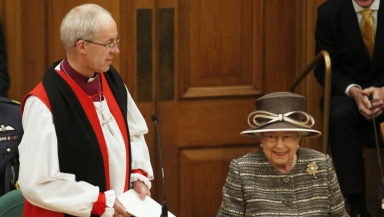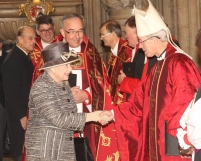
The Archbishop of Canterbury today endorsed the use of force in Syria.
In his strongest intervention yet in the terror crisis, Archbishop Justin Welby said the reality of an intervention "must include some kind of forceful response". He added: "It is almost impossible to see how it can be done otherwise."
He was speaking in General Synod, meeting in Westminster, in a debate on the migrant crisis.
He said that by endorsing the motion which called on the government to work with other nations to help establish routes to places of safety, the Church was essentially backing the use of armed forces overseas.
"The reality of working in those areas to create safe ways and routes to places of safety must include some kind of forceful response," he said.
Referring to the upcoming government proposal of extending the bombing campaign into Syria, Archbishop Welby called the Synod to listen to Bishop Angaelos and his colleagues from that part of the world that "the ideal situation is not simply to create a drain for people of those countries to escape but also to create the means by which they can stay in prosperity, in flourishing, and in safety."
The implications of this, he said are "absolutely enormous" and need a coherent response that has yet to be seen in order to "bring together all the forms of action that are required if, indeed, we face what the Prime Minister has described as an 'existential crisis'."
He supported the motion, but said that it would have significant implications:
"Not only must the church put its own money where it's putting its mouth, not only must we be deeply committed to the welcome and the private sponsorship of people coming in, but we must also recognise that in much of the Levant of the Middle East and many other parts of the world, including North East Nigeria and Burundi and other places, the forces that are driving people out into being refugees may need to be confronted."
Speaking about the Paris attacks, he continued:
"In the same way as the French police on that dreadful night had to go into the Bataclan theatre and deal with those who had taken it over, the international community has to face the necessity that it may in certain parts of the world need to challenge the equivalent people who have not taken a theatre but taken a whole section of land and using it to wreak the most terrible havoc. Let us indeed support this motion, but let us do so utterly realistically about its implications."
The Bishop of Durham, Paul Butler, qualified Welby's words by saying that "it was only in relation" to "establishing legal and safe routes" for refugees that the motion would support armed conflict.

In his initial motion, that was backed by the Synod, Bishop Butler highlighted the plight of Christian living in the Middle East and the necessity that the policies are "fair to all, including Christians."
He agreed with Archbishop Welby's sentiment that evacuating all Christians from the Middle East was not the answer, while admitting that there are Christian people who are not safe in parts of the Middle East:
"We have no wish to accelerate an exodus of Christians from any part of the middle east. We pray for the name of Jesus Christ to be uplifted in every land, not least those where the church has maintained its witness and developed its distinct local identity over long centuries.
"And yet, there are Christian people who cannot be safe or flourish in any part of the Middle East which they can reach. There is a bond of mutual responsibility and love between Christian people the world over."
Keen to emphasise that Christian love is "as blind to differences of creed as to colour or any other characteristic", he held that it is "right that we uphold the right of our fellow Christian to fair treatment.
"Whether or not they are in refugee camps, easy or hard to find, they must suffer no discrimination as UNHCR seeks out those in greatest need of resettlement. Those whose suffering is exacerbated by religiously motivated persecution deserve to have that factor given full weight in the calculation of need."














